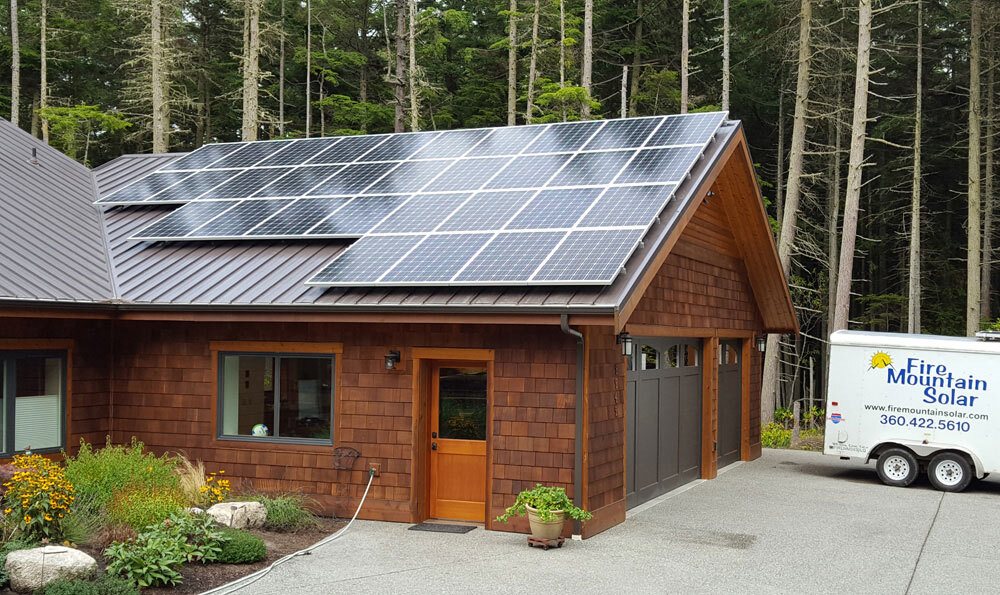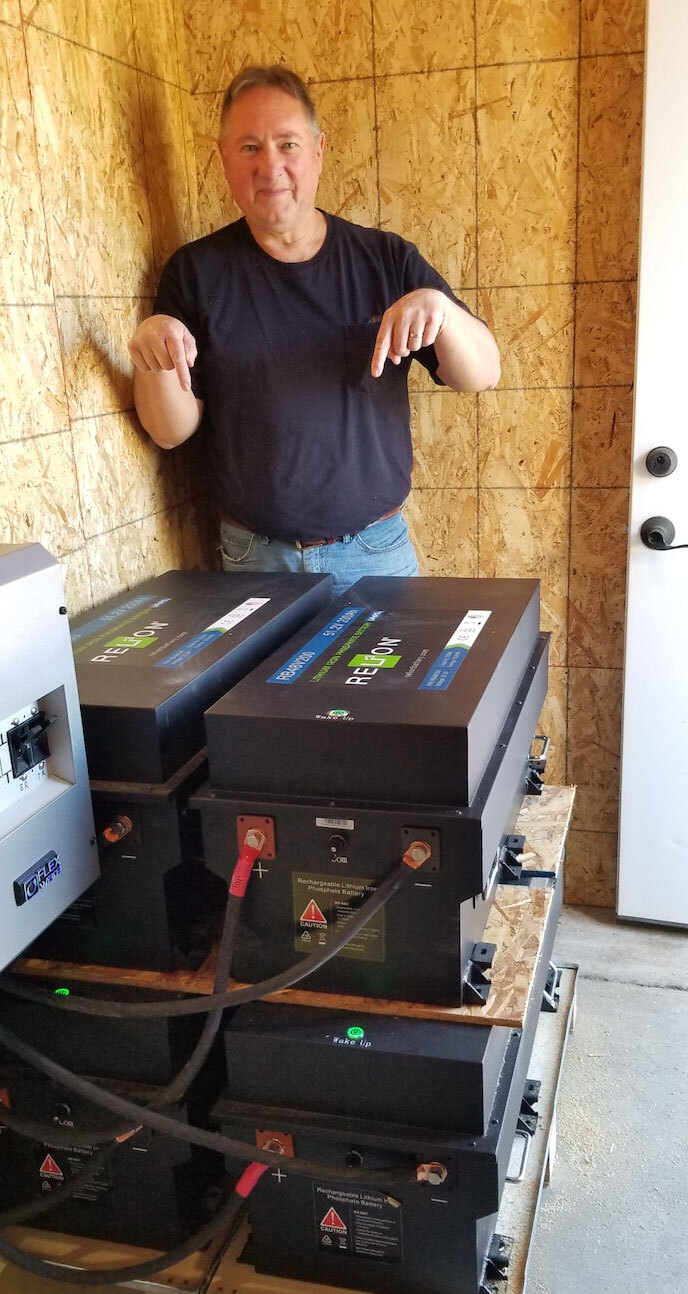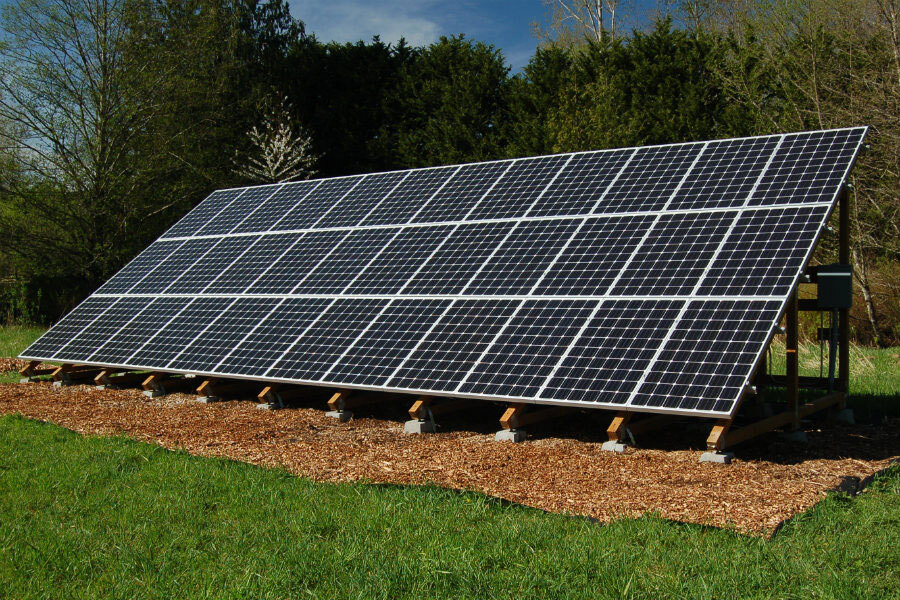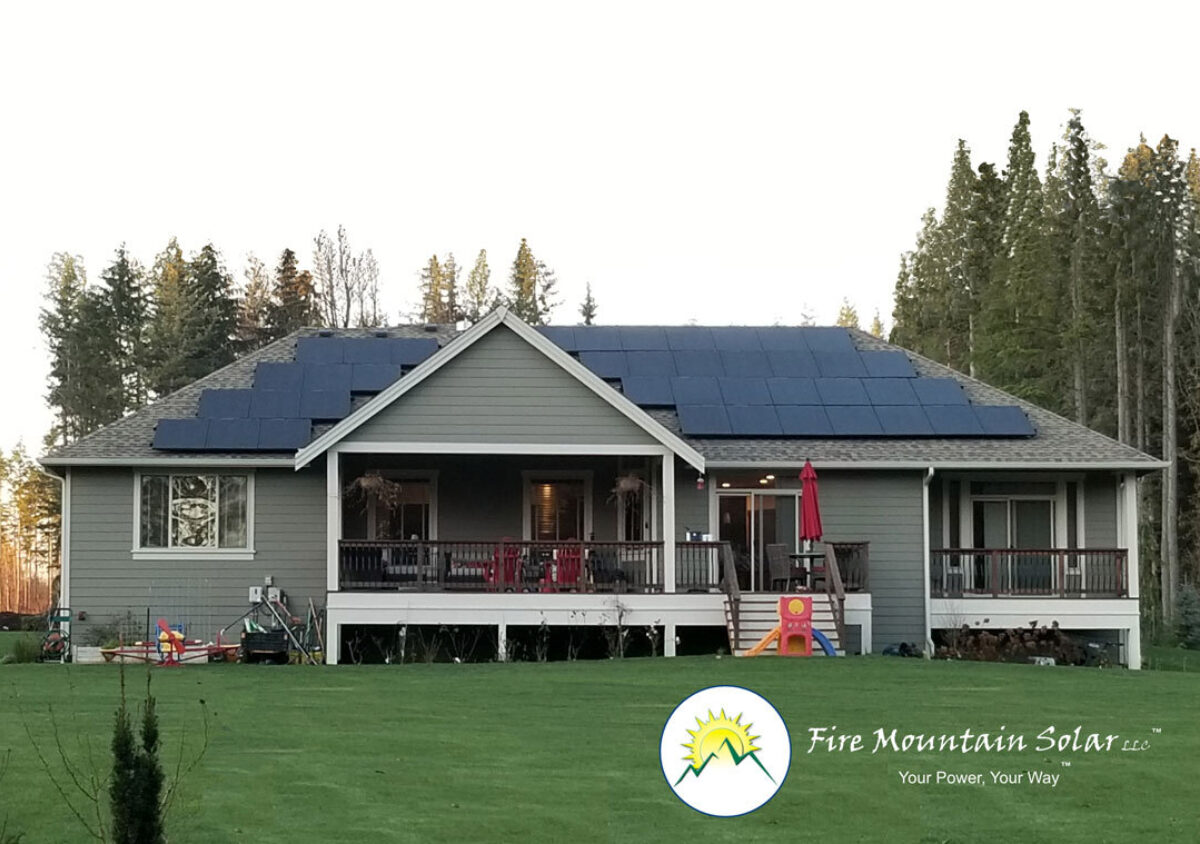Owners Tim and Alana Nelson bought a piece of land in Skagit County, Washington in 1996 that didn’t have utility power. Not wanting to sacrifice the beauty and peacefulness of nature by installing and relying on a noisy generator, they built and installed a solar energy plus energy storage system instead, reserving a generator exclusively for backup. Fourteen years later when utility power was brought in, they upgraded their solar system to grid hybrid, which today includes RELiON batteries for power during utility outages.
In 2001, they founded Fire Mountain Solar (FMS) to help others take advantage of clean and safe energy to power their homes and businesses. FMS offers complete consulting and design services for commercial and residential solar electric systems (PV), emergency backup power, and other power generation systems. Customers can install the systems by themselves with DIY solar systems, or FMS also offers full installation services for Washington state residents.
As interest in renewable energy solutions has steadily grown over the years, people have become more interested in grid-tied systems. When Alana and Tim first opened FMS, most companies in the solar industry didn’t sell energy storage systems because of the perceived costs, but FMS did and continues to. Now, as people have become more interested in utilizing backup power during utility outages, other contractors have had to play catch-up learning about battery-based systems. Meanwhile, FMS has cultivated an intimate knowledge and expertise of off-grid and grid hybrid power systems, specializing in energy storage systems for over 20 years, in order to meet their customers’ needs.
We spoke with Alana, Co-Owner and Administrative and Business Manager at FMS, about how she and her husband transitioned to solar, their business, and what is currently driving more and more people to opt for solar energy and lithium batteries.
What is the biggest question people have when going solar?
“People must have a good idea of how much power they need. Often, customers will come to us with the size and shape of their home, but the square footage matters less for solar than how much power is being used. If you don’t have enough energy with utility systems, you can always purchase more. With off-grid solar planning, sizing is critical because you need a more precise sense of how much power is being used. Additionally, customers need to know how many panels can fit on their roof to get an accurate picture of how much power they’ll ultimately be able to produce. All of these analyses are done by experts at FMS to make sure that customers will have power when they need it.”

Can you walk us through how you go about installing a solar-plus-storage system?
“The first thing we do with customers is the calculations. There are two numbers people need to know - they need to know how much energy they need to produce and how much energy they want to be available from the storage system. Most customers are interested in being connected to the grid, and for those customers, their solar size is based on their annual power consumption and the amount they want to offset. For energy storage, the battery system size is based on how much energy is required for essential items to run. What’s important for people to realize is that if you don’t have a backup generator and you use all the storage before the grid comes back up, you’ll need to rely exclusively on solar for running loads and recharging the batteries. Typically, when the grid goes down, it’s during a storm when there isn’t much sunlight. To make sure people aren’t stuck without power, we walk customers through their different sizing options.
For those who want to be completely off-grid, the process is a little more intricate. People are essentially their own utility companies, so if they run out of power, they have to manage it on their own. For these customers, we use a more comprehensive list of loads to calculate the right amount of energy storage and solar energy that will be needed to make sure they are fully prepared.
Our team usually takes about one or two days to conduct the calculations and size the system. After that, the installation of the solar and energy storage systems takes between one and two days for a small to medium system, or up to three days for a larger system.”

Have you seen more customers interested in lithium in recent years?
“Yes, definitely. Lithium batteries have been a game-changer, especially for off-grid power systems. Historically, deep cycle flooded lead acid batteries were the standard because they were the best option among the lead acid battery choices available at the time to handle the frequent charging and discharging seen in off-grid systems. However, there have been many difficulties that have come with using lead acid batteries in off-grid systems. For example, lead acid batteries should only be discharged at about 50 percent in order to avoid damaging the batteries. This can be hard to adhere to in off-grid systems that are cycled frequently. Therefore, lead acid batteries often end up having a very short lifespan. Their short lifespan means that long-term costs add up due to frequent replacements.
With lithium, the off-grid lifestyle has become much more convenient, cost-effective, and accessible for more people. Lithium batteries last longer and require zero maintenance, so off-grid systems end up costing less over the same lifespan. They can be cycled frequently and deeply, and last two to three times longer than lead acid batteries, making them a much better solution for people with a grid connection who are looking for emergency backup power as well. Additionally, they are very durable through temperature variations. For customers coming in for lead battery replacements or installing an off-grid system for the first time, we always suggest they try lithium batteries because of the myriad of benefits they provide. The majority of our new energy storage systems use lithium batteries.”
Why have you chosen RELiON as a partner?
“We started using RELiON because they had a solid reputation and track record of supplying energy storage systems for a wide array of applications. Since using them, we’ve found that they are extremely reliable and the company’s customer service is unmatched. Our priority is being confident that our customers can rely on the systems we install, and using RELiON batteries has helped us achieve that. Their responsive customer service teams allow us to provide the exceptional service to our clients that we pride ourselves on, and they are often the most competitively priced on the market. RELiON also offers a variety of capacities, which is helpful to our customers who often have varying needs, depending on if they are intending to power small systems or full-time systems.”
What are the most popular RELiON battery models and why do they work so well with your systems?
“Most of our customers require either a 24 volt or 48 volt lithium battery, so our biggest sellers are the RB24V100, RB24V200, RB48V100, and RB48V200 batteries. These options provide the best support for solar-plus-storage systems because of their capacity - they have up to 50 percent more capacity and last much longer than lead acid options. For our customers with lower capacity needs, the 12 volt power systems are suitable and we recommend the RB100 - RB300 series. Additionally, it’s a great benefit to have the Low-Temperature line available for customers using lithium batteries in colder climates.”

How important is an environmental impact to your clients?
“Being environmentally friendly is top of mind to both our customers and us. Traditional lead acid batteries are anything but environmentally friendly due to their off-gassing and toxicity, and we are proud to offer our clients an alternative that not only has a less environmental impact but also performs at a higher level and will support their system no matter the weather conditions.”
Do you think there will be any changes to market trends in the coming years?
“What we’ve noticed is that people are increasingly looking for reliability and resiliency - utility outages and extreme weather are becoming more frequent, and people need to be able to keep their refrigerators working and lights on. Energy storage, with or without solar, is one-way people can trust that their power system won’t leave them stranded in case of emergency, which is a huge motivator for them to invest. These systems also allow clients to increase their personal electricity generation and minimize energy purchased from the utility. The greater control they have over their own system makes it possible for customers to take full advantage of their energy storage and avoid demand charges and premiums. In states like Hawaii, where net metering has been eliminated, energy storage allows solar adopters to store their own power for use at night since they can’t rely on banked credits, so they can reduce the overall cost of purchased electricity. All the benefits of these energy systems - financial, environmental, and logistical - have driven more and more people into the market. I expect that this will continue as people come to need a more reliable and functional system.”
With costs having plummeted in recent years, solar-plus-storage systems are now a popular alternative to depending solely on a local utility, and that trend is expected to only grow. Fire Mountain Solar’s dedicated team has the expertise to design and install solar and energy storage systems with RELiON batteries that customers can trust to handle anything from power outages to extreme weather. Whether you are looking for a lead acid battery replacement or looking to invest in your first solar-plus-storage system, get in touch with a Fire Mountain Solar representative today to learn more.
